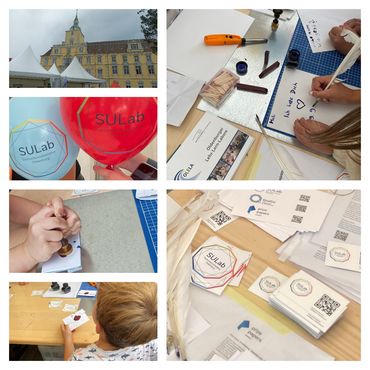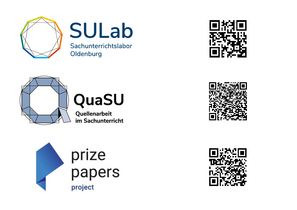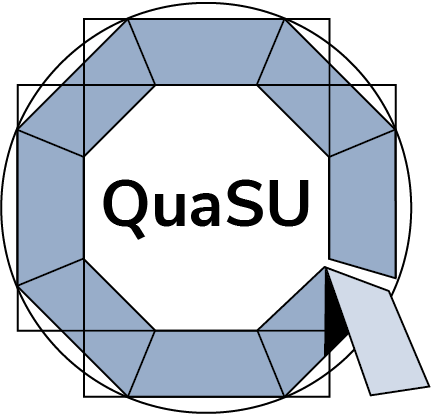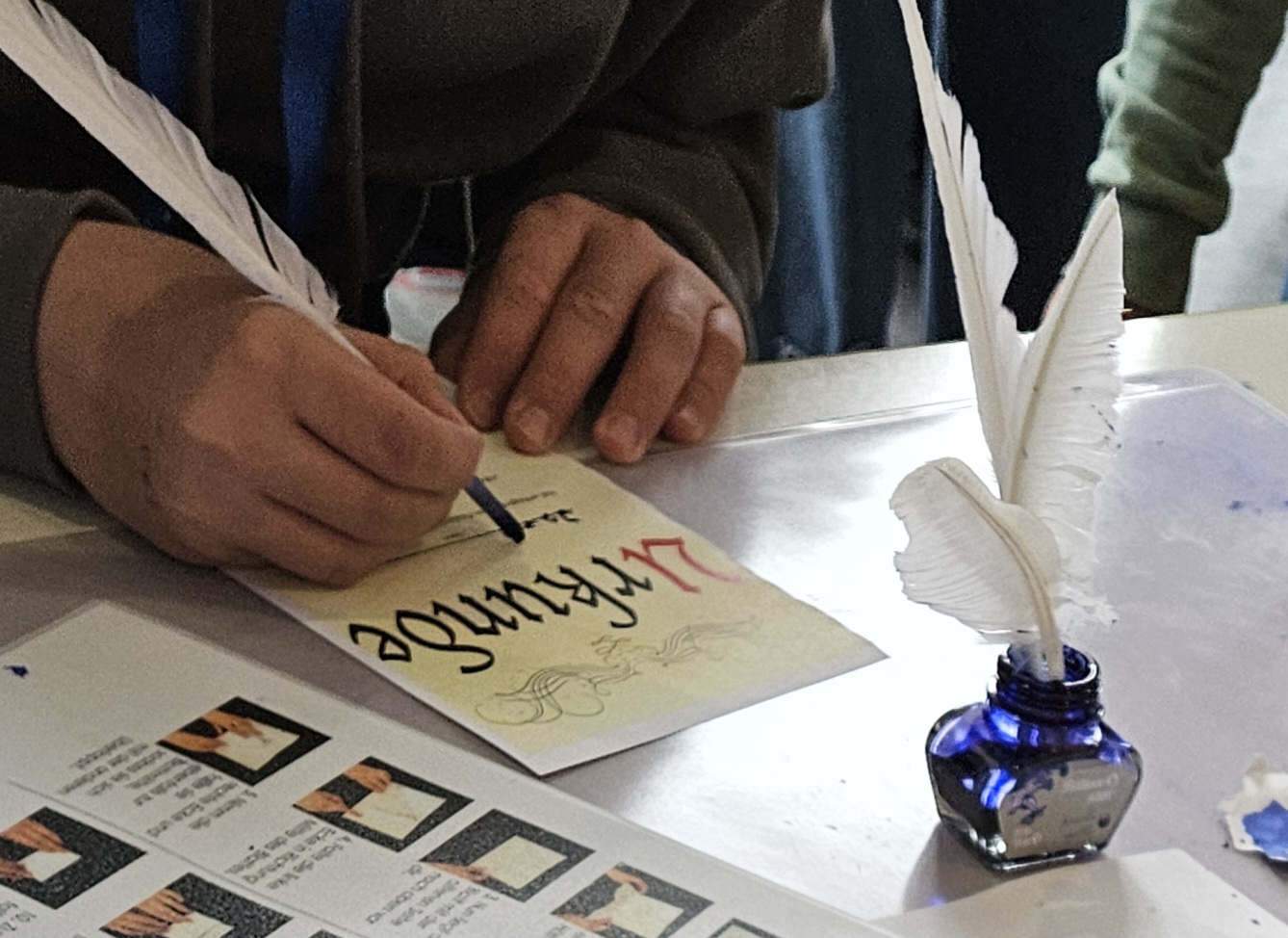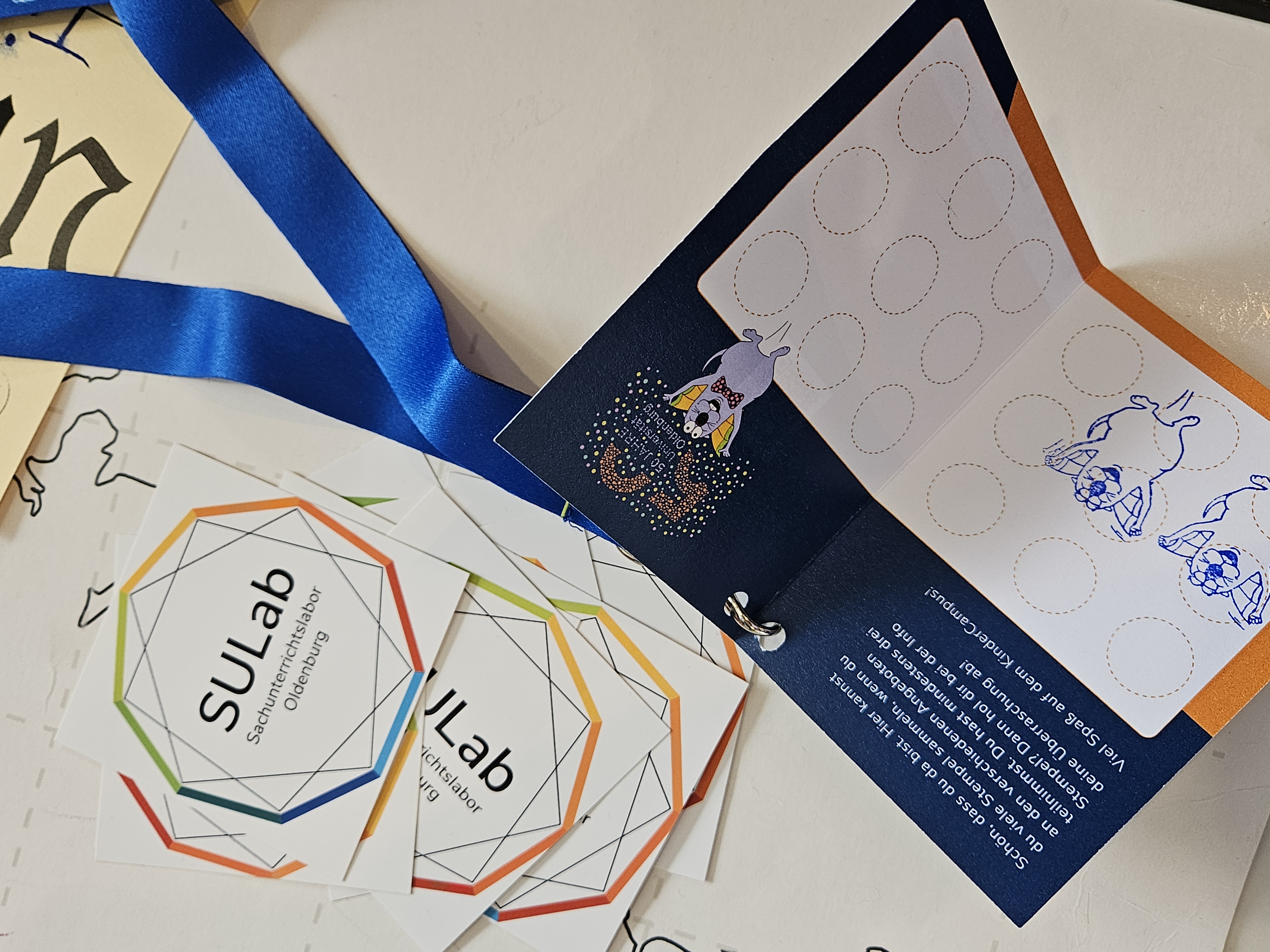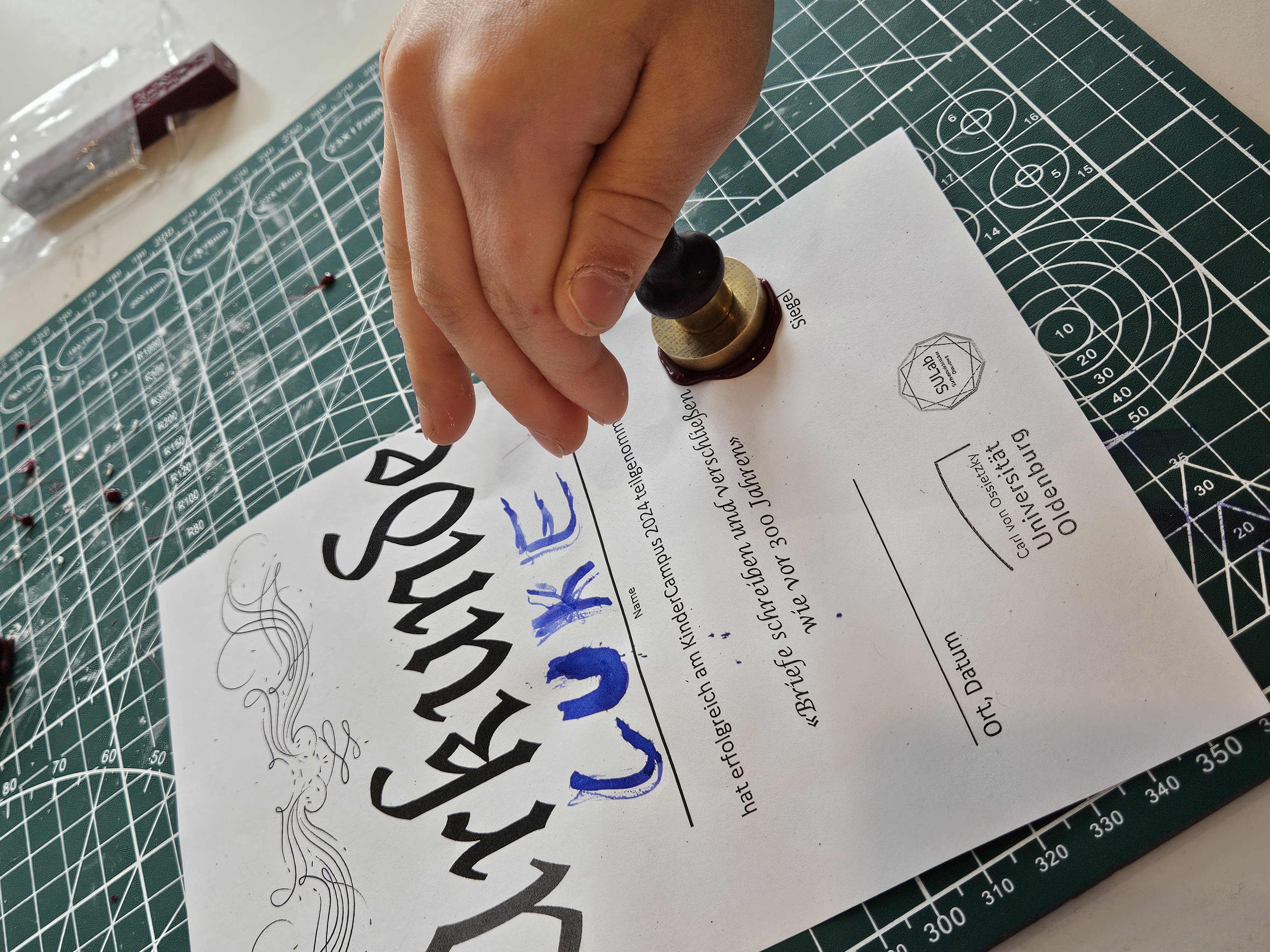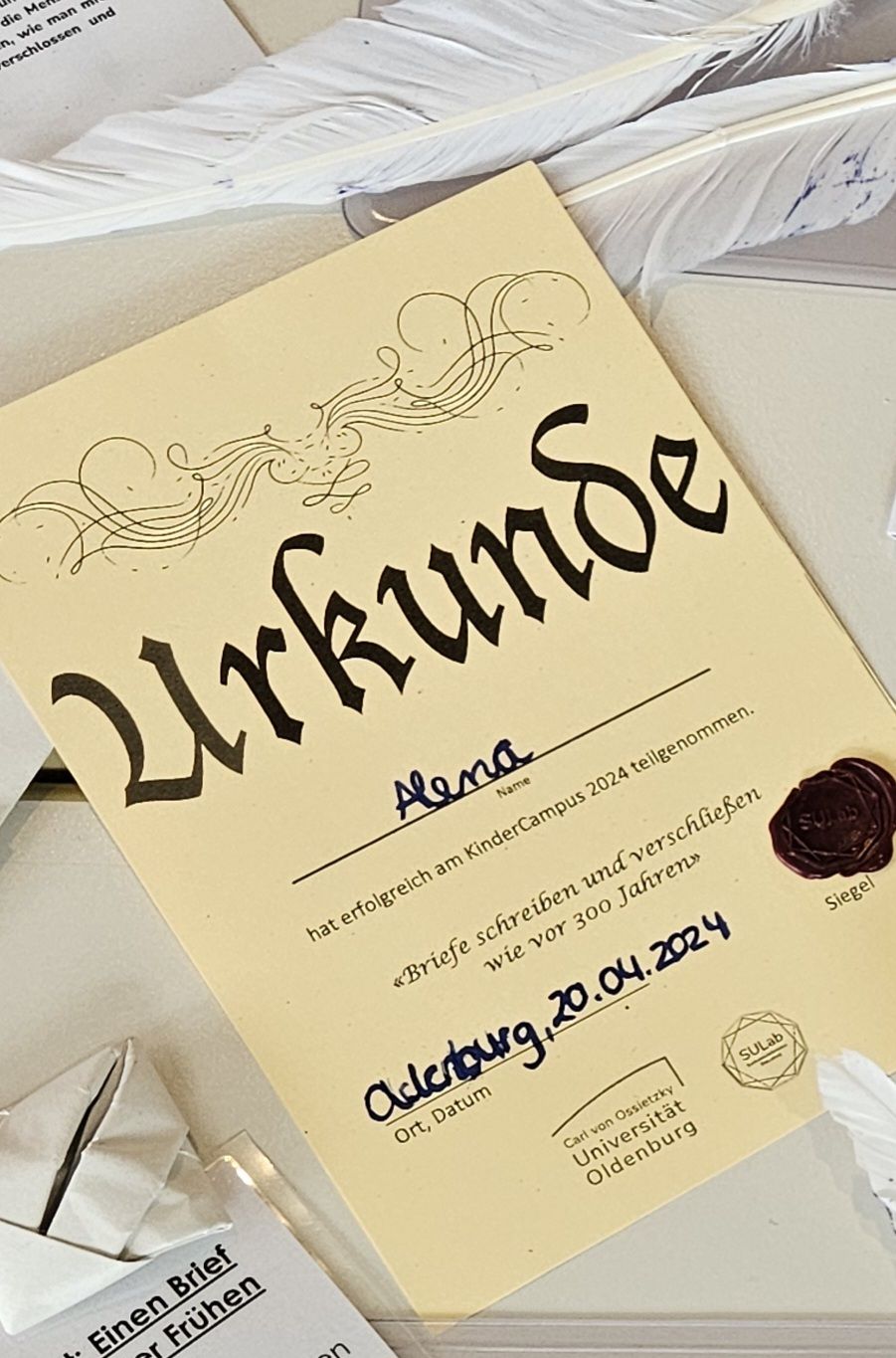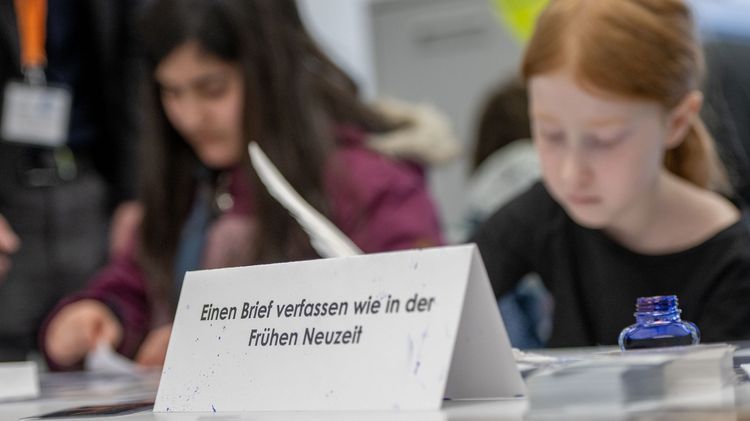QuaSU
co-operation project
HiPepro: Professionalisation of teacher students for the historical perspective in Sachunterricht
together with
- Prof. Dr Eva-Kristina Franz, University of Trier
- Dr. Anabelle Thurn, PH Freiburg
QuaSU
News: KinderCampus event 2024
Stand on 20.4.24 from 10.00 to 13.00 in the foyer of building A14
Life without WhatsApp: Letters used to be written with a bird's feather. There were no envelopes 300 years ago. Back then, stationery was folded into packets. There was a sophisticated system of folding techniques. At the SULab station, you can try out for yourself how to write with a feather and how letters used to be securely closed and sealed.
This is an offer from the Oldenburg SULab teaching and learning laboratory.
Source work in Sachunterricht teaching
Sachunterricht is a subject with natural science and social science content. It is taught exclusively in primary school and supports a general understanding of science at primary school age.
The project QuaSU (Working with Sources in Sachunterricht) investigates the work with historical sources in Sachunterricht.
First of all, (learning) tasks and instructional material will be developed on the basis of concrete factual sources. This will be followed by considerations regarding the practical implementation of these materials in the subject lessons.
Historical thinking and pupil conceptions of primary school children will also be used as a research object.
With regard to primary school children, the development of a procedure for dealing with sources is planned. This is to be transferred into modelling with a long-term view.
Within this framework, co-operation with institutions and facilities, e.g. museums and source collections, is also planned in order to implement these considerations using selected material sources.
The first co-operation has been contractually concluded with the Prize Papers Project in June 2022. With the support of a guest lecturer from the Prize Papers, the first projects have been realized in a seminar on the use of sources in Sachunterricht.
As a second co-operation, the project "HiPepro: Professionalization of teacher students for the historical perspective in Sachunterricht" was established together with Prof. Dr. Eva-Kristina Franz and Dr. Anabelle Thurn in September 2022.
Duration
since 11.2021
Financing
- Own funds of the Institute
- 4.2022-10.2022: Funding of a teaching project through the "Research-based Learning" programme of the University of Oldenburg (forschen@studium): Acquisition of personnel funds for the project study in the module of Interdisciplinary Sachbildung in the summer semester 2022. After completion of the module, the results will be published in the teaching concepts blog of the university: Projects in Sachunterricht with Prize papers
Cooperation partner: Prize Papers Project
Research Partners
The Prize Papers Project was established as an interdisciplinary and inter-faculty co-operation between the subjects of history. Since 2018, a team of Oldenburg historians led by Prof. Dr. Dagmar Freist has been digitising and researching the captain's goods from around 30,000 ship conquests. The material from the London National Archives includes ship's papers, lists of goods, private letters, diaries, medical treatises, notes and much more. Voices of men, women and children from a wide range of social and spatial contexts, unheard for 250 years, provide insights into networks and everyday routines of a global, early modern world.
The Prize Papers Project collaborates with the project QuaSU, which examines work with historical sources in primary school social studies lessons. The subject of Sachunterricht is a subject with natural science and social science content. It is taught exclusively in primary school and supports a general understanding of science at primary school age. It is planned to develop (learning) tasks and teaching materials based on the material sources from the Prize Papers collection. This will be followed by considerations on the practical implementation of these materials in subject lessons. The historical thinking of primary school children will also be used as an object of research. With regard to primary school children, the development of a procedure for dealing with sources is planned in the long term. This is to be further developed into a model.
Dr. Silke Bakenhus is responsible for and leads the project. She works at Faculty I - Department of Education and Social Sciences in the Department of Primary Education and Social Studies at Carl von Ossietzky University Oldenburg, Germany.
Publications & Lectures (Prize Papers Project)
Publications
- Bakenhus, S. (2024). Time travel to the Early Modern period with teaching materials based on sources from the Prize Papers Project. Primary History – The primary education journal of The Historical Association, Issue 97, summer 2024, p.42-45.
- Bakenhus, S. (under review, 2024). Prize Papers als Quellenmaterial für den Sachunterricht?! Ein erster Praxistest von Materialien. GDSU – Journal.
Lectures
- Bakenhus, S. (2024). Präkonzepte von Grundschulkindern zur Frühen Neuzeit - Kinderzeichnungen als Analyseinstrument. Forschungskolloquium der Mitarbeitenden im Grundschullehramt Universität Greifswald im Sommersemester 2024, 24.04.24.
- Bakenhus, S. (2024). „So stell‘ ich mir einen Piraten vor“ – Erfassung von Vorstellungen zur Frühen Neuzeit anhand von Kinderzeichnungen. Vortrag zur 33. GDSU-Jahrestagung in Hannover an der Leibniz Universität Hannover vom 07. bis 09. März 2024 mit dem Titel "Mit Sachunterricht Zukunft gestalten?! – Herausforderungen und Potenziale im Kontext von Komplexität und Ungewissheit", 07.03.2024.
- Bakenhus, S. (2023). Prize Papers in primary Education. Presented at the project conference: Prize Papers in Education with Project Director Prof. Dr. Freist and Prof. Pamela Maseko (Executive Dean of the Faculty of Humanities) Nelson Mandela University in the Eastern Cape Province of South Africa on 30.06.2023, Oldenburg.
- Bakenhus, S. (2023). Prize Papers als Quellenmaterial für den Sachunterricht?! Ein erster Praxistest von Materialien. Vortrag zur 32. GDSU Tagung in Salzburg am 23.2.2023.
- Bakenhus, S. & Marquardt, F. (accepted). Digital sources in science education for elementary school students. Vortrag zur 2022 Annual Conference in Exeter (UK), "Histories of Education as Curation: Methods, Interpretations and Technologies in an Age of Global Upheaval" ausgerichtet durch die History of Education Society (HES). 18.-20.11.2022.
- Bakenhus, S. (2022). Projekt: Quellenarbeit im Sachunterricht (QuaSU). Abstract zur Teilnahme an der Nachwuchstagung im Rahmen der 30. Jahrestagung der DGfE-Kommission Grundschulforschung und Pädagogik der Primarstufe, Regensburg am 19./20.9.22, passive Teilnahme.
Co-operation project: HiPepro
Professionalization of teacher students for the historical perspective in Sachunterricht
In didactic courses, the impression arises that students often start with misconceptions of history, regard it as a science of the past (Jordan 2022), and are not aware of the reconstructive character of history. When students inform themselves in Sachunterricht curricula of the countries, they do not find what they are looking for in terms of subject matter. This entails the danger that too little importance is attached to the subject-specific historical content in studies and school. However, an intrinsically motivated interest in historical content, which becomes particularly necessary, is often missing among primary school students (Mathis 2021). A first research hypothesis of HiPepro is therefore that there is an incorrect or missing understanding of history right into the teacher training programme (von Borries 2018) and that self-reflective historical thinking is underrepresented among SU teachers. The aim of the HiPepro project is therefore to make the professionalisation of prospective history and subject teachers more adaptive and to this end, in a first step, to test the hypothesis by means of a questionnaire survey.
Publications & Lectures (HiPepro)
Publications
- Franz, E.-K., Bakenhus, S. & Thurn, A. (under review, 2024). HiPepro: Lehramtsstudierende für die historische Perspektive im Sachunterricht professionalisieren – Pilotierung eines Fragebogens. Tagungsband DGfE 2023.
Lectures
- Bakenhus, S., Franz, E.-K. & Thurn, A. (2023). HiPepro: Lehramtsstudierende für die historische Perspektive im Sachunterricht professionalisieren – Bestandsaufnahme durch eine Fragebogenstudie. Vortrag zur 31. Jahrestagung der DGfE-Kommission Grundschulforschung und Pädagogik der Primarstufe in Siegen, "Grundschulforschung meets Kindheitsforschung reloaded”, 27.-29.09.2023.
Project studies
Sachunterrichts students develop projects withe Prize Papers sources
Based on historical written sources from the Prize Papers project, students of Sachunterricht are developing learning materials for the subject Sachunterricht.
The teaching concept has been published on the University Didactics website: https://lehrkonzepte.uol.de/projektstudium-im-sachunterricht/
Sachunterricht material from the projekt QuaSU in practice at the Paul-Maar-School, Oldenburg (Part 2 | 2.2023)
3rd graders also time travel with materials from the Prize Papers Project
After the 4th graders had already tried out the learning materials from the QuaSU project in November and December 2022, the 3rd graders were also able to discover the different aspects of the early modern period at the various stations on Tuesday, 7 February and Wednesday, 8 February 2023, under the direction of Dr Silke Bakenhus. After an introductory explanation, the pupils tried out the materials at each station with joy and enthusiasm. They seemed to particularly enjoy writing with a quill and folding and sealing the written letters.
Impressions on the homepage of the Paul-Maar-School
Sachunterricht material in practice: Paul-Maar-School, Oldenburg (Part 1 | 12.2022)
4th graders discover Sachunterricht material
On 30.11. and 2.12.22, Dr Silke Bakenhus visited the Paul-Maar-School with the support of a student assistant from the Department of Didactics of Sachunterricht of the University of Oldenburg. They brought learning materials developed by the project QuaSU, which revolve around selected sources from the Prize Papers project. The rediscovered documents from early modern capers from about 300 years ago were the focus. The pupils discovered different aspects of the early modern period at various stations: Why does a capture have nothing to do with pirates? What is a letter of capture and what does it look like? How were letters written and sealed back then? And when was the early modern period anyway? Classes 4a and 4c found answers and had a lot of fun discovering and trying out the learning material. In the future, these materials will be integrated into the newly opened SULab (Sachunterrichtslabor).
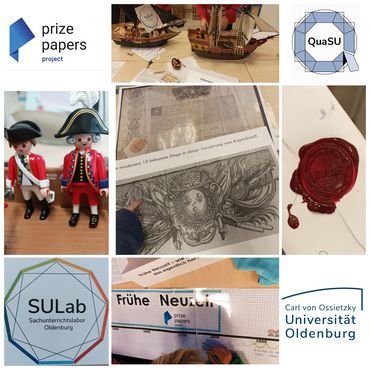
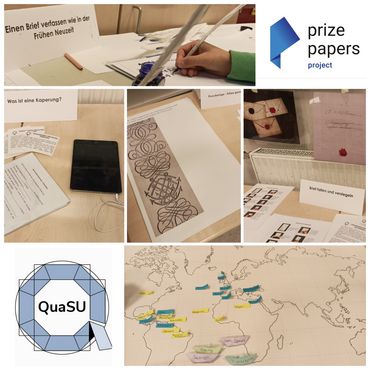
SULab on the AHOI-MINT-Festival (Oldenburger Schlossplatz, 9.9.22)
Projekt QuaSU as a part of the new SULab (Sachunterricht Lab)
Writing and sealing letters like 300 years ago
Life without WhatsApp: In the old days, letters were written with a bird's feather. Envelopes did not exist 300 years ago. The stationery was folded into packets back then! There was a really sophisticated system of folding techniques. We know this today because hundreds of folded letters are still preserved in the English National Archives in the so-called "Prize Papers". Scientists are studying these folding techniques and they want to find out what people wrote to each other back then. You can try out for yourself how to write with a quill and how letters used to be securely closed and sealed.
